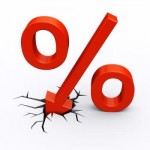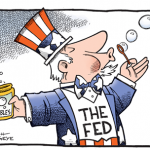
Download the Podcast in MP3 Here
FRA: Hi, Welcome to FRA roundtable insight .. Today we have Peter boockvar, he’s the chief investment officer for the Bleakley Financial Group and advisory, he has a product called the boockreport.com b o o c k report and that has great economic inside in perspective with lots of updates on economic indicators. Welcome Peter.
Peter Boockvar: Thanks Rich for having me again
FRA: Great, I thought we’d begin with some recent observation you made saying –basically we are in on the other side of an unprecedented experience of monetary largesse and experiment. Just wondering if you could elaborate on that.
Peter Boockvar: Yeah so, the liquidity tide is beginning to go out it’s more pronounced in the US with the 6 interest rates that we’ve seen so far in addition to the fed’s balance sheet beginning to roll-off. Beginning on Monday, the trend in terms of that roll up we’ll go from $60 billion a quarter, that was $30 billion in Q4 and it will increase to $90 billion a quarter in Q2. Also as each day and month—week and month goes by when we get closer to the ECB finishing their quantitative easing program and we know the bank of Japan is and buying less JGB as they focus more on yield curve control. Had some couple rate hikes from the Bank of Canada, we’re going to get a rate hike from the Bank of England in May so this is Central Bank attempts to extricate themselves from many years have extraordinary policy so that’s why I refer to this as the other side of the mountain. Easing is very easy throwing that party is very easy trying to control the hangover in a pretty benign way if it is now the hard part.
FRA: And so are all central banks and major central banks in the world doing this or just a portion?
Peter Boockvar: Well the major ones and in in some fashion or I’m even of the ECB still doing QA they cut in half as a January. They’ll probably end up by the end of the year with another sharp Caper come October 1st. So doing this all together at the same time valuations across the world are stretch both of them fixed income and equities and there’s—creates vulnerability mean anytime central banks run a tightening cycle, the world becomes more vulnerable. Both n terms of growth –economy that’s very dependent on extraordinary low rates and also on asset prices that have become very elevated. So if you believe in a free lunch then everything will be fine, if you don’t believe in a free lunch –to 7 years of zero interest rates it can quintuple Balance sheet and negative interest rates around the world then you should be more circumstanced on how this all turns out.
FRA: Now looking at the Federal Reserve how high can interest rates go before other problems begin to set in namely the challenge of servicing the debt and also on interest rate related to derivatives?
Peter Boockvar: Well, look what happened to the VIX trade, the short VIX trade. We saw 30 basis point in the 10-year yield, 30 basis points that’s it and it blew up an entire trade. So I think that was one sign of how sensitive we are too modest changes in interest rates. Again because we’ve—so many years, attached and addicted and dependent on extraordinarily low rates both In terms of its impact on the economy and certainly asset price. Again one sign of potentially more to come, now the question is the persistent rise interest rate particularly on the short end and certainly with LIBOR. This is the rise in cost of capital, this rise in cost of servicing one debt begin to impact free cash flow and maybe not yet but we seem to be headed in that direction.
FRA: And so at some point will the Federal Reserve over and other Central bank’s be constrained are limited in is normalization process?
Peter Boockvar: Umm…That’s a good question I think that that will the restraint will occur only if something breaks and I think they seem pretty intent on raising at least two more times this year I think they’ll start a front load that to give them the option whether they want to do some fourth one of the end of the year and they claim that the shrinking of the balance sheet is like watching paint dry and then will happen in the background but we know that if something happens—if markets fall and if the economy gets impacted then the FED will certainly reevaluate that policy but the problem is that if they don’t do the type of tightening that they want to do and that it somehow gets short-circuited by the market, it tells you that the FED is trapped in what they’ve created and that—them and the ECB and the bank of England. We’ve all become Japan and we had many years of lessons to learn from the Japanese by the bank of Japan getting trapped in their monetary policy and we learned none of that lesson Bernanke suppose a student of the great depression in Japan apparently studied the wrong thing because look at the situation that we’re in and 1.625% in the U.S. of the ninth year in an economic recovery and they just started shrinking their balance sheet. So we’re in dangerous land here in terms of the solid line. If things were to fall in terms of the economy or markets. Question is what is the strike price the fed put and hows the FEDs deal with it if we hit that strike—is we going to see more cuts all of the sudden? Well, they don’t have any more rates to cut. So this is going to be an interesting situation in the coming years.
FRA: And if there is a movement into recession territory—also fall in the financial markets with the Federal Reserve and other central banks being in a position to decrease interest rates and would that mean going into negative nominal interest rate territory?
Peter Boockvar: I do not believe the FED will ever go to negative nominal interest rates think you’ll blow up the money market funds. I think they’ll be riots in the streets of Washington, particularly from the AARP. So I don’t see that being politically possible and at the same time, I think that its proven that its really not a good policy. Negative interest rates is a tax on capital. It’s a tax on banks and banks will do their best to pass it on and if they don’t then they eat it themselves, but somebody has to eat the tax. So I don’t know understand the economic model to have negative interest rates is actually a good thing. I mean I understand the concept that it may force banks to go out and lend but still taxes it’s being eaten by somebody.
FRA: What about going into negative real interest rates by maybe forcing inflation to much higher levels?
Peter Boockvar: We’ve been—we’ve been in a negative interest rate environment for 10 years now so that’s like not like anything new. It would just really be more of the same and then in fact it’s negative real interest rate is what got us into this mess anyway in terms of creating all this debt and bubble type environment that we consistently seem to get ourselves into.
FRA: Speaking of tax on capital, what do you make of the recent developments on trade in terms of trade tariffs acting as a sort of the effective tax on the global economy?
Peter Boockvar: well, optically it certainly is I believe a big negative and I say optically because I’m not sure reality wise, I mean look at the steel (Unintelligble), that’s 70% of countries that we do business with has already been exempted. Half of our aluminum imports come from Canada and they’ve already been exempt. So on a dollar basis and I’m not sure it’d have that much of an impact, it will certainly hurt since the users of steel far outweigh those that produce it trying to separate what really what the economic impact is be going to be. It’ll only be felt, I just don’t think it’ll be as much as many fear. Now of course if this spirals and that’s a big problem I’m hoping that at least with China, theres some sort of agreement that this doesn’t become Become such a big deal and then holding out hope for that. So yeah it’s a risk and I’m not comfortable with Wilbur Ross and Peter Navarro making these decisions because I think they’re way off in this obsession with trade deficits, but I’m just hopeful that it won’t be that big of an economic deal— I’m more worried about the direction of interest rates and monetary policy right now even though of course the tariffs are not a good thing.
FRA: What about the last day or two here of the sell-off in the Fang stocks and a tech sector, is some of that due to concerns by the markets on the trade issues?
Peter Boockvar: I’m not sure that’s really on that I mean certainly semiconductor stocks and certainly would be potentially impacted, we certainly export a lot of consumer electronics also to China. So yeah, potentially but I think that the backdrop to the weakness in cap. tech is a few different things that granted we know that they became such outsized portions of the major indices, when you get to 500 + billion dollar market cap you obviously dominate the global market. Evaluations for some of them got expensive, I mean Facebook on a PE ratio basis pretty modest but on a price of sales basis, it was 10 times so it’s—but that was expensive as well and then once you throw in rising interest rates when people become more sensitive to valuation and we know Amazon evaluation is off the charts and then all of the sudden, threat to their business model. You know Facebook is (unintelligible) franchise I’m sure it’ll be fine but if it means that they’re going to grow more slowly if it means that advertisers are going to be more discriminating with their spend. Then not do as much on digital –maybe put it someplace else. That affects the growth rate, that affects the multiple and in stocks that I have been over owned and over loved and for many years this is what you get and obviously today Amazon getting impacted by the talk about the White House and Trump being obsessed with them and what to do about that, there’s no room for error. When you got to the valuation of levels at these companies did and now that you have both interest rate valuation and fundamental chinks in the armor it’s obviously something really important to pay attention to again, because they were such an outsized dominant presence in so many indices, so many ETF and so many mutual funds.
FRA: Do you think the sell-off in the tech sector will continue and deepen ?
Peter Boockvar: Yes I do. I don’t think that this is somehow settled in a week with a with a modest pull-back, considering how much do stocks have run up.
FRA: And what about on the—instead of doing trade tariffs could countries in central banks look at the competitive currency devaluation in terms of making the currency weaker for a trade competitiveness?
Peter Boockvar: I think we should have seen a version of that for many years but certainly the ECB wanted a week Euro and Japan wanted weak yen and we wanted a weak dollar and things like that is always an ongoing issue. Reserve Bank Australia wants a weak USA dollar and Bank of Canada wants a weak Canadian dollar and it seems like everybody wants a weak currency and what they should be really rooting for is not a weak currency, it should be a stable currency. but everyone’s trying to steal each other’s exports and I think it’s just an ongoing thing that there’s no sign of that changing anytime soon.
FRA: Will there be another round of that particularly—for example like in the US, the US administration may be wanting a lower dollar. Do you see that happening and what would be the mechanism to actually effectuate that to happen?
Peter Boockvar: well the (unintelligible) got so beat up, administration that’s so beat up for even raising the prospect of endorsing a week or dollar so I just don’t think that that’s some place that they’re going to go to, really anytime soon. I think I’ll be very implicit and left on said that they don’t mind a weaker dollar more so than anything more out right and overt.
FRA: And what do you make of China in terms of what’s happening credit crisis increase in credit, more infrastructure projects— overall how do you see China playing out ?
Peter Boockvar: I mean China’s—I mean it is so interesting in that terms of the debt accumulation has been extraordinary and banking system has become so big that I go back and forth and how this all plays out. Because the other hand they still have pretty good growth rates and im pretty bullish on China longer-term but certainly acknowledge short-term challenges they face in trying to deliver. Now they’re not going to do an outright deleveraging, their version of the leveraging will just try to be less quick or more slowly and sort of grow into it and I hope they have success but it’s likely going to be bumps in the road.
FRA: Moving to a fast-moving area topic of cryptocurrencies, what are your thoughts on the—on that do you think that governments will allow private base cryptocurrencies to co-exist alongside government currencies. You know from the monopoly power of the government?
Peter Boockvar: I mean, I think only if there was more—use of these cryptos for transactions. I mean if they’re just going to be more speculation sources of buying and selling them I don’t think they’re really going to care, but again I think if it’s stretched replacing that the payment system then I think that’s something that would wake them up.
FRA: And would that be a major driver of what you recently mentioned as potential for 90% of Bitcoin value to get wiped out?
Peter Boockvar: Well when I when I threw that out it’s I was really just talking more technically mean when I was referring to typically when an asset or stock goes parabolic, that usually ends up falling to where the parabolic move began and that was 1 to 3000 so that that’s the number I threw out that was not based on fundamentals. It was really just—okay well this is what happened in previous episodes of massive parabolic moves and you can argue that this was probably the greatest parabolic move ever that you typically give back the entire move. Just as the NASDAQ lost almost 90% of its value in 200 to 2002.
FRA: And on the major currencies—dollar, euro, yen where do you see the trend happening over the next year on that in terms of their trend movement?
Peter Boockvar: I mean, I remain Bearish on the US dollar which I guess implies that I’m bullish on the others, it’s hard to get bullish on a yen in light of the monetary Mayhem that’s going on there. But im not excited about the dollar at all, I think the euro surprises to be on the upside as well. I would not be surprised if we saw 130 or 135 at some point because I’m relatively bullish on Commodities I just don’t like the Austrian and Canadian dollars and actually like the British pound. I think that’s the case and dealing with Brexit is everyone still pretty down on them and I think that actually turns out better than feared.
FRA: And what about gold why do you see that market this being a potential for another leg higher?
Peter Boockvar: It’s in part due to my conscious—my bearishness on the dollar and also my lack of any faith that the FED can somehow pull off this this monetary tightening in any smooth fashion. Self-landing is a rare occurrence and I think there is little to no chance that they accomplish at this time around so then the craziness that’s going on with the ECB and the Bank of Japan and I think the bull market again in December 2015 and I was really just getting started.
FRA: And are you still on agricultural fertilizers?
Peter Boockvar: I am. I am extremely bullish, I think we’re beginning to see a slow down and a decline in (unintelligible) stocks for (unintelligible)… in particular, the global demand for food is still in this perpetual rise upward so if the supply situation—can at least get contained, I think that there is a lot of upside or many asset classes that are down 50-75% from their 2011-2012 peaks and the agriculture and precious metals are two of the few that fall underneath that.
FRA: Any other asset classes that you like at this point?
Peter Boockvar: Umm… Those are the two broad ones that I like. Right now the investing landscape is getting more difficult, I mean they’re plenty of one-off situations that are interesting but in terms of looking at it from a macro perspective those are the two that intrigue me. I think bigger picture longer-term I still like emerging markets. I think that the growth rate is there and continue to be better and I think the valuation are much more attractive than in the US.
FRA: Which emerging markets in particular do you like?
Peter Boockvar: I haven’t felt like—so I still like China, again acknowledging the challenges they face, India, Vietnam, I actually like Brazil as well and I actually am warming up to Greece. The Athens stock market is down 85% from its 2007 peak.
and if the new democracy which of the opposition party—If their leader Mitsotakis wins in a possible early election this year or early next year he’s a business-friendly guy that would be a real game-changer for that country that has basically been through its own great depression over the past couple years.
FRA: Yes indeed, and that’s great insight Peter. Thank you very much your thoughts.
Peter Boockvar: Yeap, thanks for having me Rich.
FRA: And just wondering how can our listeners learn more about the your work, where can they go?
Peter Boockvar: If they’re interesting in reading my daily work, they can subscribe to boockreport.com, again its boockreport.com. B double o c k report.com and also the CIO and portfolio manager at the Bleakley Advisory Group and they can check out the website at Bleakley.com
FRA: Thank you very much Peter
Transcript by Alexander Nguyen




 04/06/2018 - The Roundtable Insight: Peter Boockvar On The Monetary Experiments Of Central Banks
04/06/2018 - The Roundtable Insight: Peter Boockvar On The Monetary Experiments Of Central Banks

















